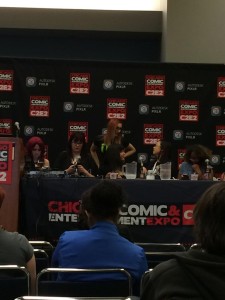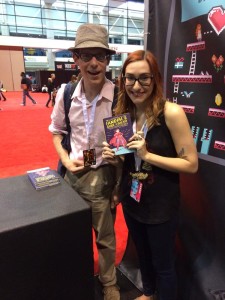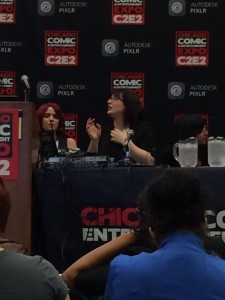Attending comic convention panels is a mixed bag of an act. I have been to some wonderful and informative ones in my time, and also ones in which a publisher simply read off a list of every single title they’ll be releasing in the next six months. The two panels I went to at C2E2 were a prime example of that mixed bag. One was ultimately disappointing, the other wonderfully illuminating.
PROMISE UNFULFILLED
I went to the Adult Swim panel on Saturday evening, held on the main stage just two hours before the Crown Championships of Cosplay, after discovering that Casper Kelly, the writer/director of Too Many Cooks, would be a speaker. My hopes that Kelly would reveal secrets of the production and explain some of the choices he made were rapidly dashed. The only informative thing he said was that he got the idea in the shower…although he made an amusing promise that 48 actual hour-long episodes of Too Many Cooks will air on Hulu this spring, although to keep the budget down there will only be one cook, played by Guy Fieri.
The rest of the proceedings comprised the other guests trying to make an improvisational mockery of the panel and not really landing the jokes (including an extended bit about Henry Zebrowski’s dead grandmother) and preview clips from Squidbillies, Aqua Teen Hunger Force (which is entering its final season), and Your Pretty Face is Going to Hell. The latter showed one of the most disgusting bits of “comedy” I have every come across, an unfunny, overlong, and repulsive matter I won’t even describe because it will make all of our readers flee the site. (Editor’s Note – Um….what was it? I NEED TO KNOW – Travis) Adult Swim is often capable of brilliance, as in Cooks and The Eric Andre Show, but this was the opposite of brilliance and made me walk out.
SPEAKING THE TRUTH
The other panel I attended was exponentially better and more informative. Sam Maggs, the associate editor of one of the finest pop culture reporting sites on the web, The Mary Sue, will soon publish her first book, The Fangirl’s Guide to the Galaxy (which I have read and is a wonderful book for every young woman/female-identifier with a nerdy obsession).
Maggs gathered several other women for a panel illuminating one of the book’s crucial chapters: The Fangirl’s Guide to Surviving Online.
Maggs and her panelists–writer/software engineer Jen Aprahamian, writer/photographer/podcaster Stephanie Cooke, comic book author Amy Chu, critic/tumblr master artist Gita Jackson, and artist Cara McGee–all found and developed their careers thanks in part to active presences on social media. One theme they constantly stressed was how much they love the Internet and are thankful it exists; they at one point referred to twitter as “the place where magic happens” with more sincerity than not. The other side of that coin, however, is the abuse women receive from male fans of nerd-geek-tech culture. Maggs and company pointed out that some men think women are moving in on their territory, when in reality women were always in that territory and now, thanks to the Internet, are more vocal than ever.
Gamergate is only the most-publicized example of this behavior. The panelists shared stories of being hate-followed, being accused of damseling (deliberately portraying themselves as victims), and constantly googling themselves to guarantee their personal information is secure. All of them, especially Aprahamian due to her her work in tech, have been on the receiving end of mansplaining for simply stating facts. When McGee was in a hospital with a life-threatening illness, one of her fans figured out her location and sent messages to her parents asking if she was alright. “On the one hand, I’m touched, but on the other, I’m hooked up to an IV and dying. Please don’t stalk me right now!” Several of them have received incredibly threatening messages.
And yet, the overall mood of the panel was a positive one, especially when they responded to audience questions (including an especially painful one from a mother whose sci-fi-loving daughter, 13, has already been called a slut in online forums) about how this can be stopped. The panel urged people to begin by visiting Zoe Quinn’s anti-harassment initiative, Crash Override, and then follow some concrete steps.
– Don’t use the hashtags and handles of the harasser, which will only escalate the situation.
– Always report any harassment to the platform authorities.
– Never be negative and go on the attack. Instead, build up your friend’s voice so she is louder than her attackers.
– Cut off friendships if you find that people hold on to opinions you can’t support.
– Above all, encourage positivity and make sure the men in your life know that ANY harassment of women (online and beyond) is wrong. Cooke described encounters she has had where she will engage trolls from this position and they come away with a different perspective. “Sometimes it’s nice to take a chance online and talk to someone you generally want to murder.”
Finally, they urged women to stick together and always have safe, closed communities to support and reinvigorate each other. The panel’s strong, optimistic demeanor is a clear sign that these communities exist and are growing, and that, thankfully for our culture, women will not be driven from the web at all. Chu, a mother of two, put it best near the panel’s end. “When we have a kid, we are biologically wired to forget the experience of the pain so we can have more kids. That’s what being a woman on the internet is like.” Hopefully, collective action will reduce these pangs in the future.







